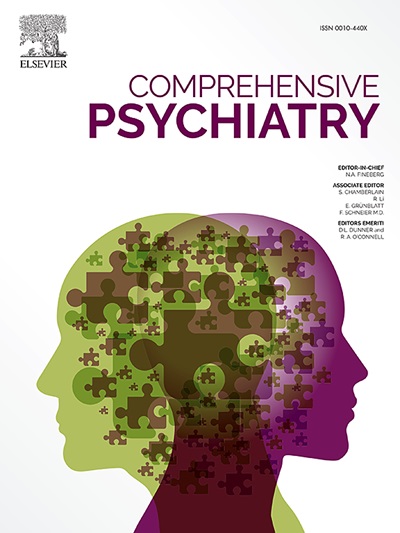The role of attachment anxiety and intolerance of uncertainty in gaming during adolescence: A two-wave longitudinal study
IF 4.2
2区 医学
Q1 PSYCHIATRY
引用次数: 0
Abstract
Adolescents with attachment anxiety can compensate via gaming for their unmet needs of closeness, reassurance, and emotion regulation. However, individual factors linking attachment anxiety to compensation via gaming are still unclear. In this two-wave longitudinal study (Wave 1, W1 = baseline; Wave 2, W2 = 6 months later), we aimed to determine whether intolerance of uncertainty (IU) mediates the link between attachment anxiety and gaming behaviours (gaming compensation, gaming frequency, and problematic gaming). Online questionnaires were administered to Italian adolescent gamers (N = 570; Mage = 15.60; SDage = 1.56; 68.8 % males). First, via path analyses, we tested whether attachment anxiety towards mother and father (W1) and IU (W1) would predict gaming behaviours (W2). Second, we tested whether IU would mediate the link between attachment anxiety and gaming compensation specifically. Multigroup analysis was used to explore gender differences. We found that attachment anxiety towards the mother and father was positively associated with IU, whereas attachment anxiety towards only the mother predicted gaming compensation at W2 both directly and via IU. Moreover, IU positively predicted gaming compensation and problematic gaming at W2. Multigroup analysis further revealed that for females, attachment anxiety towards the mother positively predicted gaming compensation at W2. Findings revealed small/modest effect sizes. Overall, attachment anxiety and IU may boost individuals to compensate via gaming, increasing the risk of problematic gaming. These results hold implications for future prevention interventions, emphasizing the quality of the parent-child relationship and IU as potential targets to foster adaptive coping strategies in adolescence.
依恋焦虑和对不确定性的不容忍在青少年游戏中的作用:一项两波纵向研究
患有依恋焦虑的青少年可以通过游戏来弥补他们对亲密、安慰和情绪调节的未满足需求。然而,将依恋焦虑与游戏补偿联系起来的个体因素仍不清楚。在这项两波纵向研究中(波1,W1 =基线;第二阶段(W2 = 6个月后),我们旨在确定不确定性不耐受(IU)是否介导了依恋焦虑和游戏行为(游戏补偿、游戏频率和问题游戏)之间的联系。对意大利青少年游戏玩家进行在线问卷调查(N = 570;法师= 15.60;SDage = 1.56;68.8%男性)。首先,通过路径分析,我们测试了对父母(W1)和IU (W1)的依恋焦虑是否会预测游戏行为(W2)。其次,我们测试了IU是否会调解依恋焦虑和游戏补偿之间的联系。采用多组分析探讨性别差异。我们发现,对母亲和父亲的依恋焦虑与IU呈正相关,而对母亲的依恋焦虑直接或通过IU预测W2的游戏补偿。此外,IU积极预测W2的游戏补偿和问题游戏。多组分析进一步显示,对母亲的依恋焦虑对W2的游戏补偿有正向预测作用。研究结果显示了小/中等的效应大小。总体而言,依恋焦虑和IU可能会促使个体通过游戏进行补偿,从而增加问题游戏的风险。这些结果对未来的预防干预具有启示意义,强调亲子关系的质量和IU是培养青少年适应性应对策略的潜在目标。
本文章由计算机程序翻译,如有差异,请以英文原文为准。
求助全文
约1分钟内获得全文
求助全文
来源期刊

Comprehensive psychiatry
医学-精神病学
CiteScore
12.50
自引率
1.40%
发文量
64
审稿时长
29 days
期刊介绍:
"Comprehensive Psychiatry" is an open access, peer-reviewed journal dedicated to the field of psychiatry and mental health. Its primary mission is to share the latest advancements in knowledge to enhance patient care and deepen the understanding of mental illnesses. The journal is supported by a diverse team of international editors and peer reviewers, ensuring the publication of high-quality research with a strong focus on clinical relevance and the implications for psychopathology.
"Comprehensive Psychiatry" encourages authors to present their research in an accessible manner, facilitating engagement with clinicians, policymakers, and the broader public. By embracing an open access policy, the journal aims to maximize the global impact of its content, making it readily available to a wide audience and fostering scientific collaboration and public awareness beyond the traditional academic community. This approach is designed to promote a more inclusive and informed dialogue on mental health, contributing to the overall progress in the field.
 求助内容:
求助内容: 应助结果提醒方式:
应助结果提醒方式:


